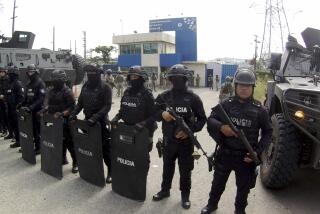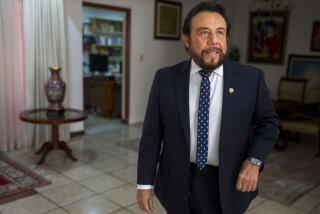Renegade Ecuadorean General in Hiding
- Share via
GUAYAQUIL, Ecuador — The cashiered air force commander who was freed from prison in exchange for Ecuador’s kidnaped president has left a military base here and gone into hiding because he fears for his safety, his brothers said Sunday.
Retired Gen. Frank Vargas Pazos abandoned the Taura air base in a jeep with an unidentified woman companion and two rebel air force corporals Saturday afternoon, the base commander said. Relatives said that he went to a private home somewhere near the base, 15 miles southeast of Guayaquil.
Vargas had been flown to the base Friday after mutinous paratroopers seized civilian President Leon Febres Cordero during a ceremony there and forced him to sign a congressional amnesty bill dropping charges of insubordination against his chief military rival.
The Ecuadorean leader and 30 other hostages were then freed, and the 12-hour uprising ended with two presidential bodyguards having been killed and 10 other people wounded.
But nobody in this sprawling industrial seaport, which is home to the strong-willed conservative president and much of the large, proud Vargas clan, believed that the feuding between them was over.
Rene, Publio and Difilo Vargas, three of Frank Vargas’ four brothers, said they could not disclose his whereabouts until a military court heeds the amnesty and dismisses charges arising from a coup attempt by the general last March to protest his forced retirement.
“He is strategically camouflaging himself to avoid any reprisals,” said Difilo Vargas.
“The essential thing here is that we do not trust the word of Leon Febres Cordero,” said Rene Vargas, who himself was dismissed by the president as army commander in 1984 and is now a congressman of the center-left opposition.
He said Frank Vargas believes that the president might order him imprisoned again “or make a terrorist act against his life.”
As the 55-year-old president flew to the capital city of Quito on Sunday for the funerals of two of his bodyguards slain in the assault against him, knowledgeable Ecuadoreans speculated whether their small Andean nation is big enough for both him and the 51-year-old Frank Vargas.
“Febres Cordero may be an elected civilian, but his rule borders on dictatorship,” said Patricia Burbano, editor of Vistazo, the country’s largest news magazine. By refusing to sign the amnesty bill passed last October, she said, “he misjudged Vargas’ popularity in the armed forces.”
At Taura, the country’s largest air base, the 40 to 50 rebels who took part in Friday’s bloody revolt went about their duties Sunday under a presidential exemption from disciplinary action.
A lieutenant sympathetic to the rebels, who would not give his name, said Vargas has the loyalty of a majority of air force officers “because he is one of the few real leaders” in the military.
However, a close political ally of the president said the government still has the solid support of the military high command.
The armed forces have ruled Ecuador often in this century, most recently from 1972 to 1979, and frequent rumors of military plotting keep the memory of those years alive.
Febres Cordero, the third constitutional president since then, is said to have worried when he took office in 1984 that keeping two brothers in the top army and air force posts would make him more susceptible to a coup.
He retired Rene Vargas from the army while keeping Frank Vargas as air force commander. But then Rene Vargas, a distinguished career officer who had run the state oil company in the 1970s, began publicly criticizing Febres Cordero’s move to step up the pace of oil exports.
About that time, Frank Vargas found himself cut off from the president. In an attempt to save his own job, relatives said, he asked Febres Cordero to be the godfather of the youngest of his 11 children. The president accepted, but the defense minister had him retired anyway, by failing to promote him to four-star rank.
Last March, Frank Vargas staged two revolts in which four people died. He got one of his demands, that the defense minister resign, but ended up in an army prison awaiting trial.
Ecuadoreans knowledgeable about the air force said Friday’s revolt was plotted after the chief military judge, a Febres Cordero loyalist, won reelection by his peers, apparently assuring a long sentence for Vargas. The sentence, which could have stretched 15 years, never came.
Both the government and supporters of Vargas said he was so closely guarded in prison that he could not have played a role in planning Friday’s revolt.
The president’s brother, Nicolas Febres Cordero, admitted over the weekend that word of the plotting had reached him and the defense minister a week ago but said that the president’s trip to the base proceeded anyway because they lacked the names of any suspects.
More to Read
Sign up for Essential California
The most important California stories and recommendations in your inbox every morning.
You may occasionally receive promotional content from the Los Angeles Times.













